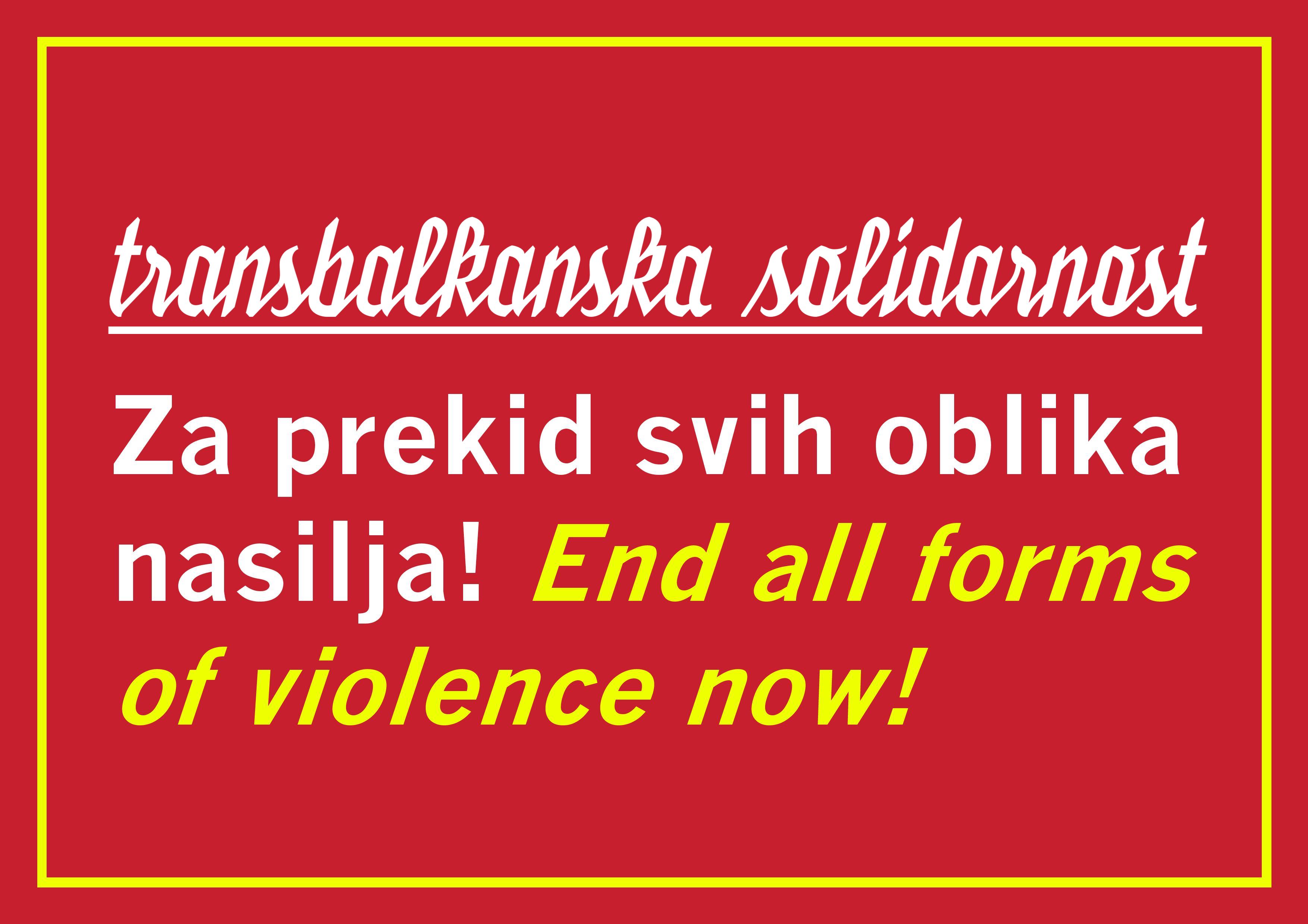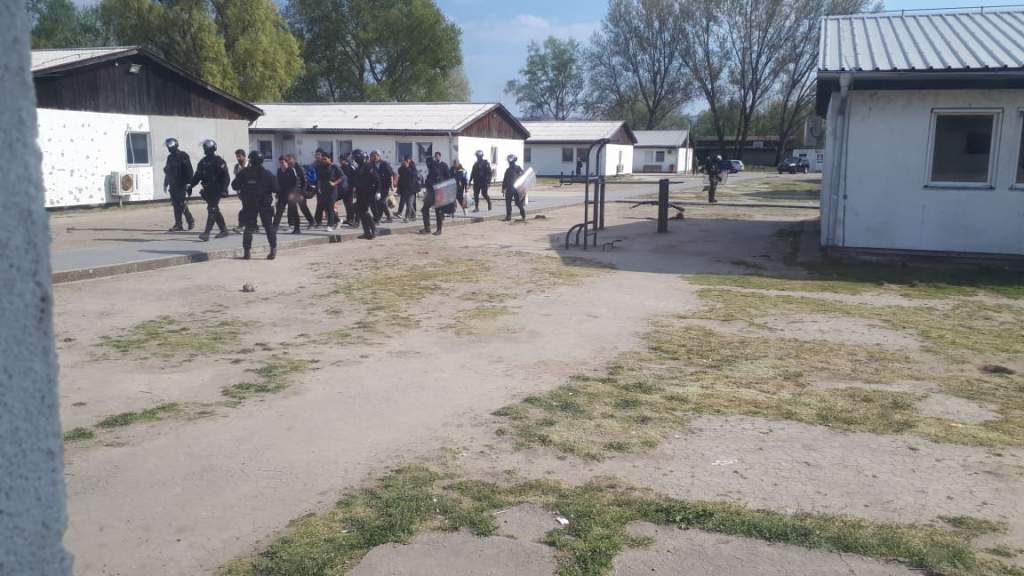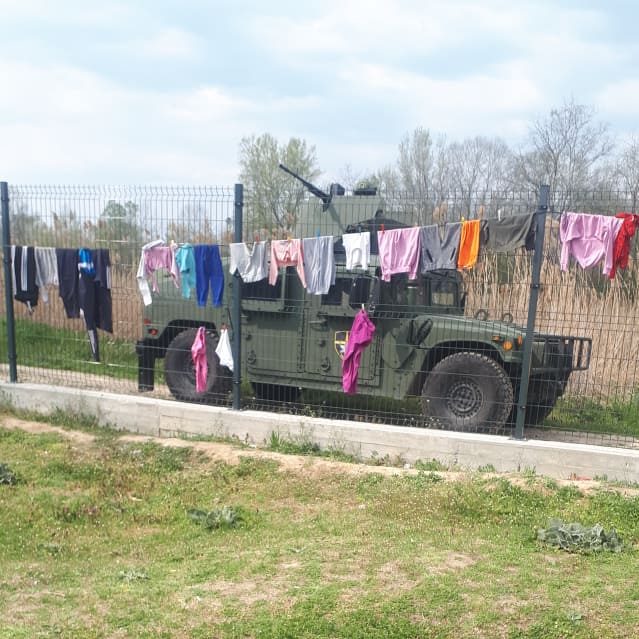Krnjača: Policijsko nasilje mora stati odmah!
Dana 10. aprila 2020, oko tri sata poslije podne, u kamp Krnjača pored Beograda, upale su jake snage žandarmerije. Uz asistenciju Komesarijata za izbeglice Srbije (KIRS), i po njihovom spisku, tražili su i premlaćivali pendrecima štićenike ovog kampa, te ih izložili suzavcu u zatvorenom prostoru. Nakon toga, puna dva autobusa ljudi koji su živjeli u kampu odvedena su u nepoznatom pravcu.
Svemu ovome svedočila su i deca.
Ovakvo policijsko nasilje je kazneno djelo! Ne tako davno su ovakvi postupci bili osuđivani kao zločini protiv čovječnosti.
Kako saznajemo, neposredni povod je “incident” u kome su predstavnici kampa u vrat udarili dečaka koji je zatražio pidžamu. Nakon toga, ostali štićenici kampa su se opravdano pobunili protiv nasilja.
Štićenici ovog kampa, kao i predstavnici organizacija koje se bave ljudskim pravima, smatraju da je razlog – kao i pre – želja KIRS-a da prenese poruku da se neće dobro provesti onaj ko se bude bunio ili tražio podžamu ili sapun. Hej, sapun!
Ono što donekle razlikuje ovaj događaj od prethodnih sličnih je količina nasilja i nanete povrede, o čemu još sakupljamo informacije.
Poslednjih meseci u Srbiji svedočimo brutalnom nasilju nad migrantima i izbeglicama koje sada kao da dobija svoje opravdanje i razlog u merama koje su preduzete u borbi protiv širenja pandemije, uvođenju vanrednog stanja i protivustavnom raspuštanju Narodne skupštine (čime je direktno prekršen član 109. Ustava Republike Srbije).
U sklopu mera o ograničavanju kretanja, uvođenjem policijskog časa koji vredi za sve, migranti i izbeglice koji ulaze u Srbiju sa namerom da prođu i nastave dalje, bivaju odvođeni u kampove koji nemaju smeštajne kapacitete da prime toliki broj ljudi. Tako imamo situaciju da je u kampovima koji mogu da prime 6000 ljudi smešteno njih 9000, bez mogućnosti da sprovedu izolaciju i higijenske mere zaštite. Ove mere i način na koji se realizuju govore nam da je njihova namera isključivo da se zaštiti lokalno stanovništvo, ali ne i sami migranti i izbjeglice.
Neizvesnost i strah se povećavaju i time što kad god se oslobode mesta u nekom od kampova, ljudi bivaju premeštani bez da im se kaže gde ih odvode, čime se krše njihova prava jer ih se tretira kao opasnost, a ne kao da su u opasnosti.
Posljednji ‘incident’ u kampu Krnjača dio je sistemske i sistematske politike koja opetovano dehumanizira one koji su izbjegli i protjerani. Mučenja ove vrste, i drugi oblici ponižavanja kroz koje prolaze oni koji su se zatekli u Srbiji u doba pandemije, u kontradikciji su s međunarodnim humanitarnim pravom koje štiti ljudska prava i slobode.
U pravnom vakuumu u kome čitavom zemljom vladaju predsednik i premijerka, građanima i građankama Srbije se dosuđuju višegodišnje zatvorske kazne zbog kršenja mera u vezi sa kontrolisanjem kretanja i to na blic suđenjima preko skajpa. Na društvenim mrežama se šire teorije zavere i lažne vesti čija su migranti i izbjeglice glavna meta što rezultira povećavanjem nasilja nad ovom grupom ljudi.
U vreme ranjivosti i straha za živote bližnjih usred krize zbog pandemije Covidom 19, kada su uzajamna briga i nega prioriteti svih, oni koji su na margini bivaju još dublje gurnuti i odbačeni, isključeni i zanemareni. I kao da ni to nije dovoljno, oni postaju predmet mržnje.
Podsjećamo na naše ranije zahtjeve u kojima smo, upozoravajući da trenutna migraciona politika EU doprinosi nasilju nad ljudima u pokretu na cijelom Balkanu, istakli kako ova situacija istovremeno zahtijeva oprez i otvorenost te nas poziva na organiziranu podršku izbjeglicama, migrantima i drugim skupinama u riziku. Na to nas obvezuje elementarna čovječnost, pa i temeljna javnozdravstvena logika jer niko nije bezbedan dok svi nisu bezbedni!
Transbalkanska solidarnost
Pandemics: Police beatings instead of soap
Krnjača: Immediately stop police violence!
On April 10th, 2020 at 3 p.m. special police forces entered the camp Krnjaca near Belgrade. They were assisted by the Commissariat for refugees of the Republic of Serbia (Commissariat). Using the Commissariat’s list of people under their protection, the police targeted some people, but also used physical violence indiscriminately against people detained in the camp, beating them with batons. The police also used tear gas in the closed facilities. After the violence, two busses were loaded with people who lived in the camp and they were taken to an unknown location.
This was all done in the presence of children.
Such police violence is a crime! Moreover, this form of action and use of violence has been prosecuted and sanctioned under charges of crimes against humanity.
Based on the information shared with us, the immediate cause for police intervention was an “incident” in which the camp employees hit one boy in the neck. The boy had just asked for pajamas. Subsequently, the other people under protection in the camp understandably raised their voices against the violence.
The people living in the camp and representatives of human rights organizations working with them believe that the intent of the Commissariat is to send a message that anyone who resists, even by asking for pajamas or soap – will be punished. Soap!
This event differs only slightly from previous ones, as it involved more violence and injuries. We are still in the process of collecting further information.
In Serbia, we have been witnessing brutal violence against migrants and refugees for some time. However, this is now being justified and rationalized through the measures taken to stop the spread of COVID-19 pandemic. As part of those measures a state of emergency was proclaimed in Serbia, which was followed by the unconstitutional dissolution of the People’s Assembly (which directly violates the Article 109 of the Constitution of the Republic of Serbia).
As part of the extraordinary measures limiting movement, the implementation of the “police curfew” applied to all, migrants and refugees, who enter Serbia with the intention to pass through the country in transit, are taken to camps that lack the capacity to house so many people. As such we have the situation where 9000 people are housed in centers built for 6000 without the conditions to observe proper isolation or hygienic protection measures. These measures and the way they are implemented indicate that they are intended exclusively to protect the local population, but not migrants and refugees themselves.
Uncertainty and fear are on the rise, particularly due to the arbitrary removal of people to different locations without providing them with any prior information about why and where they are being taken. Migrants and refugees are treated as a danger rather than being in danger themselves.
The latest “incident” in the camp Krnjaca is part of a set of systemic and systematic policies that repeatedly dehumanize those who are exiled or forced to flee. This type of torture and the other forms of humiliation experienced by migrants and refugees who have found themselves stuck in Serbia during the pandemic is in contradiction with international humanitarian and human rights law.
In the context of a legal vacuum, when the whole country is under the authoritarian rule of the President and the Prime Minister, people are being convicted in ad hoc trials held via Skype to several years of imprisonment for minor violations of the limitations on movement. Social networks serve as a platform for dissemination of conspiracy theories and fake news while targeting migrants and refugees and increasing violence against them.
In the time of such fragility and fear for the lives of loved ones in the midst of the Covid-19 pandemic, when the need for mutual care and aid is highly prioritized, people on the margins of society are even further pushed away, isolated, excluded and neglected. As if that is not enough, they are subjected to acts of hatred.
While expressing our concern about the current EU migration politics and its contribution to increase in violence against people on the move across the Balkans, we recall what we have already emphasized saying that the current situation requires caution and openness, while calling us to maintain organized support to refugees, migrants, and other groups at risk. This is required of us out of elementary humanity as well as the basic logics of public health because no one is safe until we are all protected!


